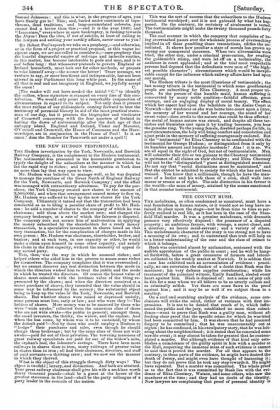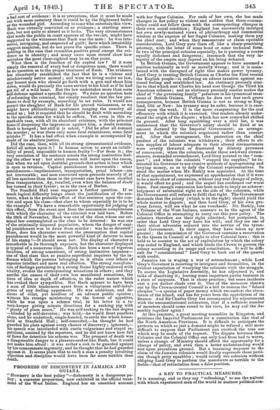THE CONVICT HUSH.
THE melodrama, so often condemned as unnatural, must have a i real foundation n human nature, or it would not so long have re- tained its place upon the stage—nor be from time to time so per- fectly realized in real life, as it has been in the case of the Stan- field Hall murder. It was a genuine melodrama, with dramatis personte very effectively disposed : the possessor of a disputed property ; an ambitious farmer, with wrongs, a secret closet, and a mistress an heroic maid-servant ; and a variety of others. This melodramatic character of the story is too strong not to have a meaning of its own ; and to understand that trait will help us to a better understanding of the case and the class of crimes to which it belongs.
Rush was convicted almost by acclamation, sentenced with the audible approbation of the public in court ; and he will be hang- ed forthwith, before a great concourse of farmers and labour- ers collected to the weekly market at Norwich. It is seldom that a case has exhibited such an accumulation of evidence : practi- cally, no one entertains the shadow of a doubt that Rush was the murderer; his very defence supplies corroboration; while his treatment of the principal witness, Emily Sandford, steeled every heart against him. Rush is disposed of: not a sense of pity can be felt for a man whom we all believe to be so utterly callous and so criminally selfish. Yet there are some flaws in the proof against him ; and it may be as well if we subject them to a scrutiny.
On a cool and searching analysis of the evidence, some con- clusions will strike the mind, rather at variance with first im- pressions. It is not to be denied that much of it, which influ- enced the public and the jury, established no more than coinci- dence—went to prove that Rush was a guilty man, without af- fording clear proof that the specific crime for which he was tried had been committed by him. It was shown that he had procured forgery to be committed ; that he was unaccountably out at nights ; he has confessed, in his exculpatory story, that he was loit- ering about the neighbourhood ; it is stated that he concealed some terrible event; it may almost betaken for granted that he contem- plated a murder. But although evidence of that kind only esta- blishes a coincidence of the guilty spirit in him with a murder at the Hall, respecting the immense HMS of such evidence it cannot be said that it proved the murder. For all that appears to the contrary, in these parts of the evidence, he might have desired the death of Jermy, and might even have thought of hastening it ; but they do not prove that he took any step towards it. He might have repented. But a murder was committed. The whole proof as to the fact that it was committed by Rush lies with the evi- dence of Eliza Chestney, Watson, and some others, who saw the murderer at the time ; and they had no doubt of the identity. Now lawyers are complaining that proof of personal identity is a bad sort of evidence: it is so precarious, that it must be made out with more certainty than it could be by the frightened butler or the wounded girl. According to some who entertain this view, Rush was virtually convicted on no evidence ; a startling asser- tion, but not quite so absurd as it looks. The very circumstances that made the public in court approve of the veraict, might have suggested to the witnesses that Rush was the man : he was inte- rested, intriguing, and suspected of guilt; facts which irresistibly suggest suspicion, but do not prove the specific crime. There is nothing in the case that resembles positive proof except the evi- dence as to identity ; and many cases upon record show how mistaken the foost clear-sighted may be on that point. What then is the function of the capital law ? If it were simply the removal of every bad or dangerous man, there would be no question as to the proper treatment of Rush. The evidence has abundantly established the fact that he is a vicious and mischievously active animal ; and were we living under no law, any honest man who should go forth with a gun and shoot him down, would do precisely the same service to his kind as if he had got rid of a wild beast. But the law undertakes more than mere self-defence against a specific danger. We raise no question here of reforming the criminal, but simply recollect that the law pro- fesses to deal by example, according to set rules. It would not permit the slaughter of Rush for his proved viciousness, or we might have philanthropic sportsmen ranging the country all round us ; but it required that he should be dealt with according to the specific crime for which he suffers. Yet even in this re- markable case, with all its abundant evidence, with the prisoner himself deepening the impression against him, a doubt remains. Rush is hanged ; but still it is asked, "Did he after all commit the murder; or was there only some fatal coincidence, some fatal mistake ?" It has a bad effect when example is accompanied by doubt of its absolute justice. Did the case, then, with all its strong circumstantial evidence, forbid all action upon it ? Is human action to await an infalli- bility of proof, impossible to human frailty I—Far from it ; the very execution of the sentence attests the strong instinctive feel- ing the other way : but strict reason will insist upon the canon, that when we act upon doubtful grounds that action is best which is open to revision. Capital punishment is irrevocable : other punishments—imprisonment, transportation, penal labour—are not irrevocable; and men convicted upon grounds scarcely if at all less specious than those in the present case have been recalled from transportation: Ay, recalled, even when the balance of doubt has turned in their favour ; as in the case of Barber.
The Stanfield Hall case suggests a further question. If so much logical difficulty hangs about the justification of the sen- tence, what is the probable effect of that sentence upon the con- vict and upon his class—that class to whom especially he is to be the example? We have a remarkable opportunity for judging of this effect, from the event and from the uncommon completeness with which the character of the criminal was laid bare. Before the 28th of November, Rush was one of the class whom our cri- minal law contemplated as the class to be deterred : he was one of the criminally disposed population, whom the danger of capi- tal punishment was to deter from murder : was he so deterred! More, does his character warrant the presumption that capital punishment would be the most powerful kind of deterrer to men of his stamp I—It should seem not. The display of character is remarkable in its thorough exposure, but the character displayed is typical of a numerous class. Rush has been a man of vigorous faculties, of strong sensations, of strong instinctive impulses— one of that class that so puzzles superficial inquirers by the in- fluence which the persons belonging to it attain over others of superior intellect and more real affection. The strong manifesta- tion of feelings pertaining to a strong frame highly endowed with vitality, evokes the corresponding sensations in others ; and they ascribe the causes of their own less manifested sensations, the force of idea or depth of affection, to the ruder nature which has evoked their sympathies. But Rush appears to have been a man of little tenderness apart from a voluptuous self-indul- gence of any feeling uppermost. He was ambitious, and de- sirous of eclat, yet heedless of an adverse public opinion ; witness his strange ministering to the lowest of appetites, while he was upon a solemn trial, in his letter to a ta- vern-keeper giving minute directions for a sucking pig with "plenty of plum sauce." He was self-seeking to the last degree —blinded by self-devotion ; was bold,—he would front poachers alone, and he undertook, single-handed, to settle the whole house- hold at Stanfield Hall ; self-conceited,—he thought be had guarded his plots against every chance of discovery ; ignorant,— his speech was interlarded with rustic vulgarisms and stupid re- petitions, omitted by the reporters, and he did not know how full of flaws for detection his scheme was. The prospect of death was a disagreeable danger to a pleasure-seeker like Rush, but it could not make him afraid : it was rather a risk to be guarded against by his consummate ingenuity, and he thought that he had guarded against it. It seems plain that to such a man a penalty involving abjection and discipline would have been far more terrible than death.



























 Previous page
Previous page